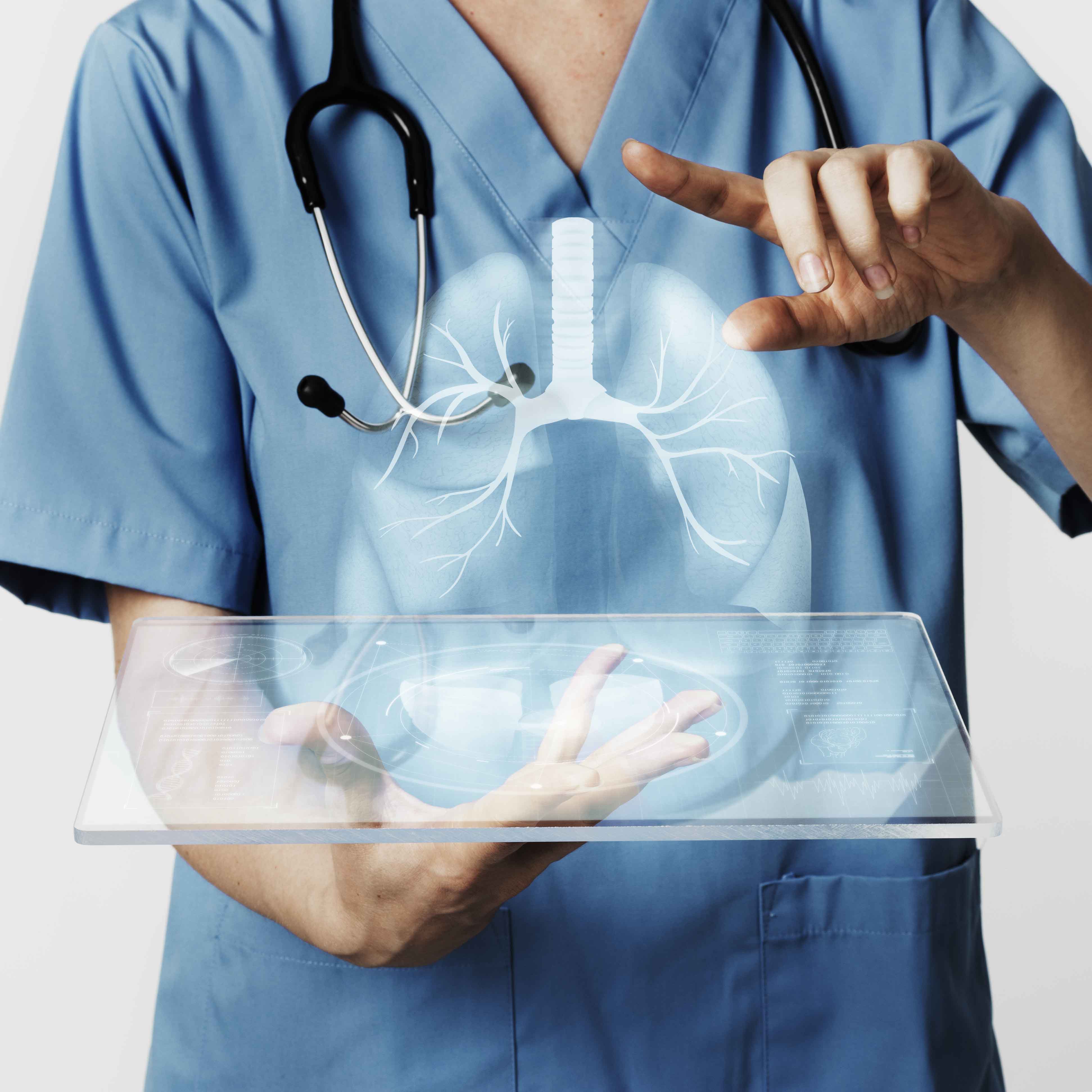Pulmonology covers asthma, COPD, ILD, TB, sleep apnea, and pulmonary hypertension; thoracic surgery treats lung cancers, mediastinal tumors, pneumothorax, and pleural disease using VATS/robotic techniques. India offers faster scheduling, English-speaking teams, and prices far below Western systems—coordinated end-to-end by MediHeal International.
Treatment Guide
Pulmonology & Thoracic Surgery
India combines advanced diagnostics, interventional pulmonology, and minimally invasive thoracic surgery (VATS/robotic) with coordinated international-patient services—delivering high-quality outcomes and substantial savings via MediHeal International.


Quick Answer
Who Needs Pulmonology & Thoracic Surgery
- Persistent respiratory symptoms (dyspnea, chronic cough, wheeze) not controlled with medical therapy requiring specialist evaluation.
- Lung mass/nodule or mediastinal lesion needing staging (EBUS/PET-CT) and potential surgical resection.
- Recurrent pneumothorax or pleural effusions (malignant or infective) requiring pleurodesis/decortication.
- Advanced emphysema with bullae, airway obstruction amenable to therapeutic bronchoscopy/bullectomy.
- Sleep apnea requiring CPAP titration or surgical opinion; pulmonary hypertension/ILD needing multidisciplinary care.
- Candidates for lung transplant at select centers (end-stage lung disease) after exhaustive medical management.
Why Choose India
- VATS/robotic thoracic programs with multidisciplinary tumor boards and integrated oncology.
- Costs commonly 50–75% lower than Western systems with transparent packages and shorter waits.
- International desks streamline second opinions, itemized quotes, visas, airport transfers, lodging, and interpreter support.
How MediHeal International Helps
- Match to centers with interventional pulmonology, VATS/robotic thoracic surgery, and thoracic oncology MDTs.
- Provide itemized quotes covering diagnostics (CT/PET-CT/EBUS), OT/ICU, implants/devices (stents/valves), and adjuvant therapy plans where applicable.
- Coordinate visas, flights, airport pickup, nearby hotels, interpreters, and structured follow-ups/tele-reviews.
Types of Pulmonology & Thoracic
- Interventional Pulmonology— Bronchoscopy, EBUS-TBNA staging, airway stents/debulking, medical thoracoscopy/pleuroscopy.
- Thoracic Oncology Surgery— Wedge/segmentectomy/lobectomy (VATS/robotic), pneumonectomy; integrated with chemo/radiation/targeted therapy.
- Thoracic Non-Oncology— Bullectomy, decortication for empyema, sympathectomy for hyperhidrosis, thymectomy for myasthenia gravis.
- Pleural Procedures— Thoracoscopy, pleurodesis, indwelling pleural catheter placement for recurrent effusions.
- Lung Transplant (select centers)— Single/bilateral transplant with strict eligibility, infection control, and long-term immunosuppression.
The Surgical Journey
Pre-arrival
- Share CT chest/PET-CT (if available), PFTs, bronchoscopy/biopsy reports, and medication list for a remote MDT plan.
- Receive written options (intervention vs surgery), staging workup, LOS, and itemized costs.
Admission & Work-up
- Finalize imaging and labs; EBUS-TBNA/bronchoscopy for diagnosis/staging when indicated.
- Anesthesia clearance, pulmonary prehab (breathing exercises), and consent.
Procedure & Early Recovery
- VATS/robotic/open surgery or interventional procedure; chest tube management, analgesia, early ambulation, incentive spirometry.
- Pathology review and adjuvant plan (if oncology).
Discharge & Follow-up
- Criteria-based tube removal; home breathing exercises and wound care.
- Tele-reviews; oncology/rehab coordination and fit-to-fly documentation.
Recovery Timeline
VATS Lobectomy
Typical hospital stay ~7–9 days; light activity in ~2–4 weeks, guided by surgeon advice.
Thoracoscopy/Pleuroscopy
Often 1–3 days inpatient; faster symptom relief for effusions/pneumothorax.
Open Thoracotomy
Longer stay and recovery than VATS; tailored pain control and rehab needed.
Lung Transplant
Prolonged ICU/ward stay; intensive rehab and lifelong immunosuppression with close follow-up.
Benefits to Expect
- Minimally invasive (VATS/robotic) options may reduce pain, air-leak duration, and length of stay compared with open surgery.
- Integrated interventional, surgical, and oncology pathways enable faster diagnosis-to-treatment.
- Substantial cost savings with coordinated logistics for international travelers.
Risks & Complications
General Risks
- Air leaks, bleeding, pneumonia, atrial fibrillation, DVT/PE, prolonged chest tube, anesthesia risks; transplant adds rejection and serious infections.
Revision Risk
- Choose accredited centers with ICU capability, experienced thoracic surgeons/interventional pulmonologists, and ERAS pathways.
- Prehab/post-op pulmonary rehab, early ambulation, incentive spirometry, and smoking cessation reduce complications.
Cost & Inclusions
Indicative Costs
- Confirm whether PET-CT, EBUS-TBNA, stents/valves, and adjuvant therapy are included; request itemized quotes to avoid surprises.
* Final quote after clinical evaluation; varies by implant, technique (e.g., robotics), hospital accreditation, city, and length of stay.
Travel & Visa Essentials
- India’s medical visa covers pulmonology and thoracic surgery; bring passport, medical records, hospital invitation, return ticket, and proof of funds.
- e-Medical visas allow short stays with multiple entries for eligible nationalities; up to two attendants can obtain linked visas.
Preparing for Surgery
- Stop smoking; complete flu/pneumococcal vaccines if advised; practice breathing exercises (incentive spirometry).
- Carry CT/PET-CT on CD, PFTs, prior biopsy/pathology, and medication/allergy lists.
- Plan caregiver lodging near hospital; arrange for recovery aids and follow-up dates before travel.
Rehabilitation Focus
- Pulmonary rehab with airway clearance, graded walking, and breathing exercises.
- Wound care and chest-tube site monitoring; nutrition optimization and pain control.
- Oncology coordination for adjuvant therapy when indicated; scheduled tele-reviews.
Frequently Asked Questions
How many days are needed in India for VATS lobectomy?
Plan ~10–14 days for evaluation, surgery, and early recovery before fit-to-fly clearance.
Is VATS suitable for all lung cancers?
Depends on tumor size/location and nodal status; some cases require open thoracotomy.
Do packages include targeted drugs or immunotherapy?
Usually not—these are billed separately. Request itemized oncology quotes.
Can a caregiver accompany the patient?
Yes. Up to two attendants can obtain linked medical attendant visas; include their details in the application.